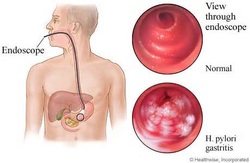
Most people don't realize they have H. pylori infection, because they never get sick from it. If you develop signs and symptoms of a peptic ulcer, your doctor will probably test you for H. pylori infection, because it can be treated with antibiotics.
Most people with H. pylori infection will never have any signs or symptoms. It's not clear why this is, but scientists believe some people may be born with more resistance to the harmful effects of H. pylori.
When signs or symptoms do occur with H. pylori infection, they may include:
- An ache or burning pain in your abdomen
- Nausea
- Vomiting
- Frequent burping
- Bloating
- Weight loss
When to see a doctor
Make an appointment with your doctor if you notice any persistent signs and symptoms that worry you. Seek immediate medical help if you experience:
- Severe or persistent abdominal pain
- Difficulty swallowing
- Bloody or black tarry stools
- Bloody or black vomit or vomit that looks like coffee grounds
H. pylori bacteria can be passed from person to person through direct contact with saliva, vomit or fecal matter. H. pylori can also be spread through contaminated food or water. The infection is usually acquired during childhood.
Many people contract H. pylori as children. Contracting H. pylori in adulthood is much less common. Risk factors for H. pylori infection are related to living conditions in your childhood, such as:
- Living in crowded conditions. You have a greater risk of H. pylori infection if you live in a home with many other people.
- Living without a reliable supply of hot water. Having a reliable hot water supply can help you keep your living area clean and reduce your risk of H. pylori.
- Living in a developing country. People living in developing countries, where crowded and unsanitary living conditions may be more common, have a higher risk of H. pylori infection.
- Living with someone who has an H. pylori infection. If someone you live with has H. pylori, you're more likely to also have H. pylori.
Complications associated with H. pylori infection include:
- Ulcers. H. pylori can damage the protective lining of your stomach and small intestine. This can allow stomach acid to create an open sore (ulcer).
- Inflammation of the stomach lining. H. pylori infection can irritate your stomach, causing inflammation (gastritis).
- Stomach cancer. H. pylori infection is a strong risk factor for certain types of stomach cancer.
Tests and procedures used to determine whether you have an H. pylori infection include:
- Blood test. Analysis of a blood sample may reveal evidence of an active or previous H. pylori infection in your body. A blood sample is usually collected by pricking your finger.
- Breath test. During a breath test, you swallow a pill, liquid or pudding that contains radioactive carbon molecules. If you have an H. pylori infection, the radioactive carbon is released when the solution is broken down in your stomach. Your body absorbs the radioactive carbon and expels it when you exhale. You exhale into a bag and your doctor uses a special device to detect the radioactive carbon.
- Stool test. A laboratory test called a stool antigen test looks for foreign proteins (antigens) associated with H. pylori infection in your stool.
- Scope test. During an endoscopy exam, your doctor threads a long flexible tube equipped with a tiny camera (endoscope) down your throat and esophagus and into your stomach and duodenum. Using this instrument, your doctor can view any irregularities in your upper digestive tract and remove tissue samples (biopsy). These samples are analyzed for H. pylori infection.
H. pylori infections are usually treated with two varieties of antibiotics at once, to help prevent the bacteria from developing a resistance to one particular antibiotic. Your doctor also will prescribe an acid suppression drug, to help your stomach lining heal.
Your doctor may recommend that you undergo testing for H. pylori several weeks after your treatment. If the tests show the treatment was unsuccessful, you may undergo another round of treatment with a different combination of antibiotic medications.
The following are the Nature's Sunshine products we've used with our clients to help them overcome the H-pylori infection. For the Nature's Sunshine web site go to: http://generali.mynsp.com/
- Gastro-Heath was formulated for H-pylori - 2 per meal
- MSM - 1 per meal to heal the stomach lining and help reduce inflammation. MSM also balances the stomach acid output.
- Probiotic Eleven 3 per day
- Olive leaf may be needed as an alternative to the Gastro-Health or rotate the formulas.
- Intestinal Soothe and Build may be needed for additional help to soothe the gut lining.
- Support Stress if needed as this may be what weakened the stomach lining.
For help with these herbal products please contact Brenda at Joyful Living Services.


 RSS Feed
RSS Feed



